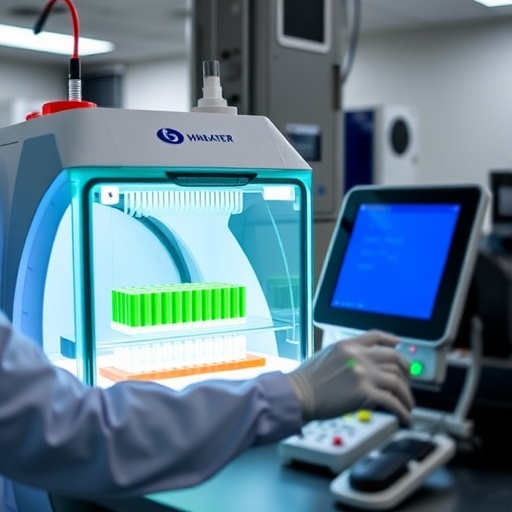
In a groundbreaking study that stands as one of the largest ever conducted in Brazil on colorectal cancer, scientists have uncovered compelling evidence about how genetic variations and ancestry influence the risk of this deadly disease. Spearheaded by researchers at Hospital de Amor, formerly known as Hospital de Câncer de Barretos, alongside collaborations from other prominent institutions and generously funded by the São Paulo Research Foundation (FAPESP), the work offers an unprecedented glimpse into the intricate genetic makeup of Brazil’s highly admixed population. Published in the prestigious journal JCO Global Oncology, the findings refine our understanding of colorectal cancer risk beyond conventional hereditary and lifestyle considerations.
Colorectal cancer has emerged as a pressing health crisis among young adults in Brazil and globally, with the National Cancer Institute (INCA) projecting an alarming 46,000 new cases in Brazil from 2023 to 2025. After excluding non-melanoma skin cancers, colorectal cancer ranks as the third most prevalent cancer in the country. This alarming prevalence prompted researchers to investigate the underlying factors contributing to its development with a particular emphasis on genetic components that may interact with environmental influences unique to Brazil’s demography.
While approximately 5 to 10 percent of colorectal cancer cases can be directly traced to hereditary germline mutations passed through families, the vast majority—about 90 percent—are classified as sporadic. These sporadic cases are predominantly influenced by modifiable lifestyle factors such as diet and obesity, yet genetics still plays a significant, albeit complex, role. The research team aimed to disentangle this complexity by identifying genetic variants that either predispose individuals to or protect them from colorectal cancer, focusing specifically on those not linked to hereditary forms.
The study embarked on an exhaustive genetic analysis, examining 45 single nucleotide polymorphisms (SNPs)—tiny variations in the DNA sequence—previously connected to colorectal cancer risk in populations of European and Asian descent. This transfer of knowledge into the Brazilian context was critical since Brazil’s population is characterized by a diverse genetic admixture arising from centuries of intercontinental mixing among Indigenous, European, African, and Asian ancestries. The team’s objective was to validate whether these SNPs hold the same relevance in this genetically heterogeneous background.
Encompassing an impressive cohort of 1,933 individuals, including 990 colorectal cancer patients and 1,027 healthy controls, the investigation combined genotyping of the selected variants with a comprehensive assessment of each participant’s genetic ancestry. The ancestry profiling utilized a panel of 46 informative markers designed to accurately quantify the proportions of European, African, Asian, and Indigenous heritage, thereby moving beyond subjective classifications like self-reported skin color. This methodological rigor allowed for a precise elucidation of how ancestry intersects with genetic risk factors.
Among the 45 scrutinized genetic variants, nine emerged with statistically significant associations to colorectal cancer susceptibility. Importantly, four of these variants maintained their strong relevance even after adjusting for multiple clinical and epidemiological variables. Intriguingly, two of these four variants correlated with an elevated risk of developing colorectal cancer, whereas the other two appeared to confer a protective effect. These markers reside within genomic regions implicated in regulating inflammatory responses and cellular proliferation, core pathways often dysregulated in cancer development.
The study’s authors emphasized that these SNPs are not somatic mutations occurring within tumor cells but normal, inherited genetic variations present since birth that influence individual phenotypic traits, including potentially disease susceptibility. This distinction is crucial as it underlines the role of inherited genetic background rather than mutations acquired during cancer progression. The ability of these variants to independently predict risk underscores the necessity of incorporating genetic diversity into cancer risk models.
One of the most innovative revelations of the study is the significant role of genetic ancestry in colorectal cancer risk modulation. Individuals with lower proportions of African and Asian ancestry exhibited higher risk levels, suggesting that certain protective genetic factors prevalent in these ancestral groups may lower susceptibility. This finding aligns with global observations linking genetic admixture with variable cancer risks, underscoring the necessity of studying diverse populations to uncover these nuanced genetic interplays.
This ancestral influence on risk may be multilayered and complex. The researchers postulate that it is not merely genetic factors at play but an intricate mosaic of genetics intertwined with socioeconomic and cultural determinants. For instance, dietary patterns commonly associated with populations of Asian descent—such as higher consumption of vegetables, fish, and lower red meat intake—could contribute to their observed reduced risk. These environmental factors likely synergize with genetic predispositions to modulate disease development, reflecting the multifactorial nature of colorectal cancer.
A defining strength of this research lies in its sample size and representativeness. Unlike prior Brazilian studies often constrained by small cohorts and limited statistical power, this investigation’s robust sample of nearly 2,000 individuals drawn from all regions of Brazil ensures comprehensive ethnic diversity. This broad inclusion provides a foundation for findings that genuinely reflect the genetic complexities within the Brazilian population, positioning this study as a landmark in genetic epidemiology in Latin America.
Looking ahead, the research team envisions leveraging these findings to revolutionize personalized medicine approaches in colorectal cancer prevention and screening. Although the identified genetic variants themselves are immutable, inherited factors, understanding their presence in individuals could stratify risk profiles more effectively. For example, combining genetic risk scores with modifiable lifestyle information—such as obesity status—could classify patients who might benefit most from intensified screening or targeted interventions.
Currently, efforts are underway to expand this genetic exploration dramatically. Building on the initial analysis of 45 candidate variants, the next phase aims to examine up to three million genetic variations through genome-wide association studies tailored specifically to the Brazilian population. This ambitious endeavor aims to generate a population-specific polygenic risk score that captures Brazil’s unique genomic signatures, potentially catalyzing transformative advances in cancer prevention and control.
The implications of this study resonate far beyond Brazil’s borders. Much of the genomic research that informs cancer risk and treatment protocols stems from studies in predominantly European and North American populations, which typically exhibit lower genetic diversity. This study challenges that paradigm by demonstrating the critical value of investigating diverse, admixed populations, offering novel insights into how genetic architecture shapes disease susceptibility in global contexts.
In conclusion, the comprehensive analysis performed by Hospital de Amor and collaborators not only elucidates critical genetic determinants of colorectal cancer risk in Brazil but also exemplifies how integrating ancestry information can refine risk predictions. These findings herald a future in which cancer prevention strategies are tailored not only to mutable lifestyle factors but also to the immutable genetic heritage of each individual, thereby enhancing the precision and efficacy of medical interventions in diverse populations.
Subject of Research: Genetic variations and ancestry influence on colorectal cancer risk in Brazil
Article Title: Association of Genetic Ancestry and Colorectal Cancer Risk in a Large Brazilian Cohort: Replication of Single-Nucleotide Polymorphisms Identified by Genome-Wide Association Studies
News Publication Date: 6-Jun-2025
Web References:
Article DOI link: http://dx.doi.org/10.1200/GO-24-00512
São Paulo Research Foundation (FAPESP): www.fapesp.br/en
References:
Study published in JCO Global Oncology, 2025
Keywords:
Colorectal cancer, Genetic epidemiology, Risk factors, Genetic diversity
Tags: ancestry and cancer riskBrazil colorectal cancer studycolorectal cancer in young adultscolorectal cancer prevalence in Brazilenvironmental influences on cancerFAPESP funded cancer researchgenetic diversity and healthgenetic variants in colorectal cancerhereditary factors in cancer riskimpact of genetics on cancerresearch on cancer geneticsunderstanding colorectal cancer risk factors




